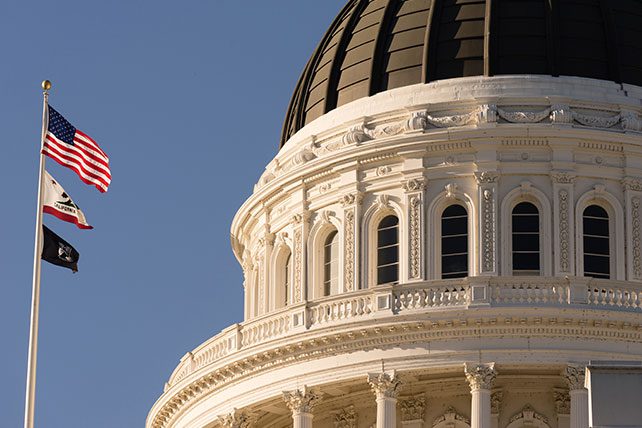Concern is growing among pastors and Christian counselors that a bill working its way through the California legislature would put them at odds with the law if they hold to biblical standards of sexuality.
The fear is that California’s AB 2943, a bill that purports to declare “sexual orientation change efforts” to be an “unlawful business practice,” makes selling books, holding conferences, advertising events or offering counseling services that hold to biblical teachings on sexual relations and gender the equivalent of consumer fraud.
AB 2943 declares “advertising, offering to engage in or engaging in sexual orientation change efforts with an individual” as illegal under state’s consumer fraud law. Sexual orientation change efforts is defined as “any practices that seek to change an individual’s sexual orientation. This includes efforts to change behaviors or gender expressions, or to eliminate or reduce sexual or romantic attractions or feelings toward individuals of the same sex.”
Constitutional attorney and author David French calls the last sentence “far broader than the traditional definition of so-called reparative therapy,” and “an attempt to change mere behavior.”
“In other words, if, for example, a sexually active gay man or woman sought counseling not to change their orientation but rather to become celibate, then the services and goods provided in that effort would violate this statute. If parents faced a child who was identifying as a person of the opposite sex, then services and goods making the argument that, for example, they should persist in calling their daughter “she” and withhold life-altering hormone treatment in part because most children exhibiting symptoms of gender dysphoria desist would violate this statute.”
French was highly criticized on social media when he suggested that the legislation is so broad it could even ban the Bible. He says debate in the California Assembly has proven him right.
“First, the bill by its own terms applies to very broad categories of services and goods. Here’s the key enabling language: 1770. (a) The following unfair methods of competition and unfair or deceptive acts or practices undertaken by any person in a transaction intended to result or that results in the sale or lease of goods or services to any consumer are unlawful:
Second, a book (along with other written materials, like pamphlets or workbooks) fits within the very, very broad definition of a goods: tangible chattels bought or leased for use primarily for personal, family, or household purposes, including certificates or coupons exchangeable for these goods, and including goods that, at the time of the sale or subsequently, are to be so affixed to real property as to become a part of real property, whether or not they are severable from the real property.
Basically, if you can buy it and move it (in other words, it’s not real estate), then it’s a good. Moreover, under the statute, “services” can include “services furnished in connection with the sale or repair of goods.” Booksellers provide “services.”
Alliance Defending Freedom Attorney Matt Sharp shares the concern claiming that, if passed, it could be a violation if a pastor encourages a congregant to visit the church bookstore to purchase books that help people address sexual issues, perhaps including the Bible itself, which teaches about the importance of sexual purity within the confines of marriage between a man and woman.
Adding to the concern are comments from lawmakers who supported the legislation and its passage in the California Assembly. When asked about worst case scenarios for an ill-defined bill, assemblymember Al Muratsuchi declared that it’s time for the faith community to “evolve with the times.”
The law, if passed, would only apply to California, but evidence of how broadly it can be interpreted are evident across the nation.
Pastor Jeremy Schossau of Metro City Church in Riverview, Michigan, faced death threats earlier this year after offering classes to teens struggling with same-sex attraction.
His church offered a workshop called “Unashamed Identity” for girls 12-16 who are struggling with thoughts of being trans, bi, gay or other.
Schossau said the program is not conversion therapy but a conversation without condemnation.
In a YouTube video in response to the controversy, he explained, “People have literally threatened to kill me and my family, to burn our house down, to burn our church down, to assault the people of our church and our staff.”
The California law is an expansion of a bill passed six years ago banning reparative therapy with anyone under 18.
Reparative therapy methods range from counseling, hypnosis and dating-skill training to aversive techniques that induce pain or electric shocks in response to same-sex erotic images, according to California officials. Such treatments stem from a belief that homosexuality is a mental illness, a view that has been discredited for decades, the state said in court papers.
Opponents say the ban infringes on their freedom of religion and free speech. The Supreme Court disagrees.
The lead plaintiff in the Supreme Court case was Donald Welch, an ordained minister and licensed family therapist who oversees counseling at Skyline Wesleyan Church in the San Diego area. He believes sexuality belongs only in a marriage between a man and a woman.
Welch, along with a Catholic psychiatrist and a man who underwent conversion therapy and now aspires to perform it on others, sued the state claiming the law is unconstitutional.
After their free speech challenge failed, the plaintiffs pressed their claim that the ban violates their right to freely exercise their religion. Last October, the San Francisco-based 9th U.S. Circuit Court of Appeals rejected their arguments.
Eleven states have similar bans in place. Two-dozen states are considering adding bans this spring, reports USA Today.
Meanwhile, pastors and Christian counselors are anxiously waiting to see what the California Senate does with the controversial proposal, and if passed, what it means for their ministries.

